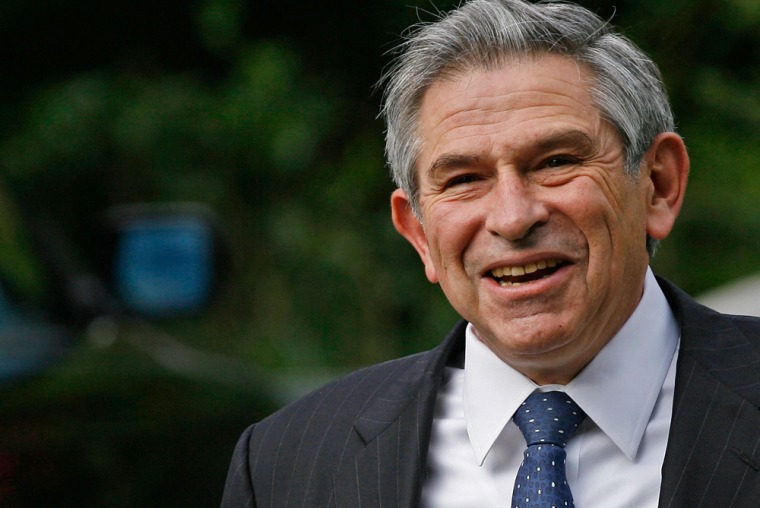Paul Wolfowitz resigned as president of the World Bank on Thursday, ending a protracted battle over his stewardship prompted by his involvement in a high-paying promotion for his companion.
“The poorest people in the world ... deserve the very best we can deliver,” Wolfowitz said in a statement. “Now it is necessary to find a way to move forward.”
His resignation takes effect on June 30.
Wolfowitz, a former U.S. deputy defense secretary who was a controversial figure as a leading architect of the 2003 U.S.-led invasion of Iraq, came to the bank in 2005 despite misgivings by European countries, which are among the bank’s biggest funders.
He fought hard up to the last hour to clear his name of any charges of misconduct, saying he should not shoulder all of the blame, after a bank panel found he broke several bank rules by involving himself in the promotion of Shaha Riza, a Middle East expert at the bank.
In a face-saving agreement, the board said it accepted Wolfowitz’s word that “he acted ethically and in good faith in what he believed were the best interests of the institution.”
Wolfowitz, 63, said he was pleased the board accepted his assurances.
U.S. President George W. Bush reluctantly accepted the resignation and would have preferred he stay at the bank, White House spokesman Tony Fratto said. He said Bush would soon name a candidate to succeed Wolfowitz.
Another American
The presidency of the World Bank is traditionally held by an American. Bush intends to continue that tradition, a White House official said, speaking on condition of anonymity.
U.S. Treasury Secretary Henry Paulson said he would move quickly to help Bush with identifying a successor for Wolfowitz. He said he would consult with counterparts around the world.
Bank staff were jubilant to see an end to a crisis that had engulfed the institution, which spends around $25 billion a year to fight poverty in poor countries.
“Everyone ran into the hallways and were clapping and hugging each other,” said one employee who declined to be named.
The controversy sparked outrage among some of the bank’s 10,000 employees and prompted senior staff to write to the board complaining that the leadership crisis had undermined their work, especially in fighting corruption.
Double standards?
Some questioned what they called Wolfowitz’s double standards on governance and fighting corruption, which he had made a priority as bank president.
The bank’s staff association, which pushed for the investigation into his role in Riza’s promotion, said the June 30 resignation date was unacceptable and insisted Wolfowitz be put on administrative leave immediately.
“It completely undermines the principles of good governance and the principles that the staff fight to uphold,” it said.
European board officials said Wolfowitz decided on Wednesday to resign after he realized he had lost the support of developing countries, including those in Africa that had supported him until a few days ago.
One official said Wolfowitz confided the same day in representatives from Britain, Canada and Mexico that he was seeking a resolution and would resign.
In its statement, the World Bank board said it concluded from the whole affair that its internal governance needed to be reviewed.
“It is clear from this material that a number of mistakes were made by a number of individuals in handling the matter,” it said.
The board is scheduled to meet on Friday to discuss leadership issues.
Anti-poverty and development groups called for a selection process based on merit, not nationality.
“The current unjust arrangement by which the U.S. gets to appoint the head of the World Bank and the Europeans pick the head of the IMF has to end,” said Bernice Romero, advocacy director for international development group Oxfam.
